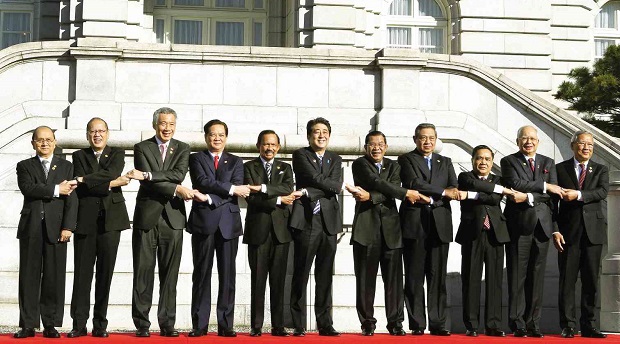
Asean-Japan Summit Leaders of the Association of Southeast Asian Nations lock arms during the 40th Asean-Japan Commemorative Summit on Saturday at the Main Garden of the Akasaka State Guest House. They are (from left): Thein Sein (Burma), Benigno Aquino III (Philippines), Lee Hsien Loong (Singapore), Nguyen Tan Dung (Vietnam), Hassanal Bolkiah (Brunei), Shinzo Abe (Japan), Hun Sen (Cambodia), Susilo Bambang Yudhoyono (Indonesia), Thongsing Thammavong (Laos), Najib Razak (Malaysia) and Pracha Promnok representing Yingluck Shinawatra (Thailand). INQSnap this page to view more photos! MALACAÑANG PHOTO
TOKYO — Leaders from Japan and 10 Southeast Asian countries on Saturday pledged to cooperate in ensuring freedom of navigation during a summit overshadowed by concerns over China’s growing assertiveness in the region.
A joint statement issued after the summit meeting refrained from an explicit mention of China’s recent declaration of a maritime air defense zone over the East China Sea. But it was the backdrop behind the promise to cooperate to ensure “freedom of overflight and aviation safety in accordance with universally recognized principles of international law.”
“To the Chinese, we are calling on the withdrawal of all the measures that violate these general principles,” Japanese Prime Minister Shinzo Abe said. He said Japan would stick to its decision advising airlines to continue their operations as they had before China’s announcement.
“Raising tensions in this region is to nobody’s advantage,” Abe said in a nationally televised news conference showcasing what he called Japan’s “special partnership” with the Association of Southeast Asian Nations.
The summit marks 40 years of ties between Japan and ASEAN, a resource-rich region of more than 600 million people. Abe has visited all 10 ASEAN countries in the past year, seeking to boost both security and business ties, a warm contrast to frosty relations with China.
Earlier Saturday, Tokyo pledged 2 trillion yen ($1.9 billion) in aid to Southeast Asian nations over the next five years to help close the region’s development gap and improve its disaster preparedness. It also promised another $100 million to support the Japan-ASEAN Integration Fund.
The Japanese side listed on its “urgent agenda” assistance for improved maritime security and more effective coast guards, help with cybersecurity and counterterrorism, closer communications connections and improved disaster preparedness and management.
Much of Asia suffered under Japanese occupation in World War II, and Southeast Asian leaders have been wary of a potential resurgence of Japanese militarism.
But like Japan, several ASEAN countries have territorial disputes with China that remain potential flashpoints.
China’s sudden declaration last month of the air defense zone over islands in the East China Sea that are claimed by both Japan and China raised hackles across the region. Some worry China might follow up with a similar zone in contested areas of the South China Sea.
“ASEAN’s role as a center of economic growth depends on freedom of the seas and the air,” Abe said.
Japan has been expanding investments across Southeast Asia, especially since 2012, when anti-Japanese riots flared in China after Tokyo nationalized a group of uninhabited islands claimed by both countries.
RELATED STORIES:
Asean-Japan summit gets under way in Tokyo
PH warship now patrolling sea off Palawan
Japan, Asean celebrate 40 years of ties

